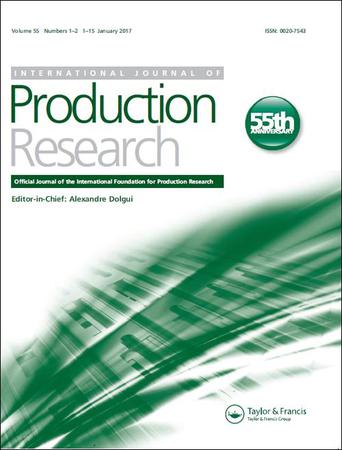Novel control strategies and iterative approaches to order various COVID-19 vaccines to prevent shortages and immunisation expansion
IF 7.3
2区 工程技术
Q1 ENGINEERING, INDUSTRIAL
International Journal of Production Research
Pub Date : 2023-09-12
DOI:10.1080/00207543.2023.2254394
引用次数: 0
Abstract
This paper suggests control strategies for ordering various COVID-19 vaccines and assigning vaccine recipients to immunisation stations in order to minimise shortages. To determine the optimal quantity of multiple vaccines to order, a fuzzy periodic review model is proposed. Furthermore, vaccine recipients are prioritised into different groups based on their occupation (e.g. essential workers), age cohort, co-morbidities, and pre-existing diseases. To model vaccine recipients’ waiting and improve vaccination effectiveness by reducing congestion in immunisation stations, a queuing framework is utilised. Due to the suppliers’ lack of commitment to the mass production of vaccines during the COVID-19 pandemic, the number of orders delivered to the cross-docking facility is considered uncertain. A rolling planning horizon approach is implemented using an iterative method to prevent vaccine shortages. To validate the proposed model, a case study is conducted using data from Arak City in Iran, and sensitivity analysis is performed on the model parameters. The analysis of the results indicates that the rolling planning horizon approach and the possibilistic chance-constrained programming improve network performance against operational risks, including the COVID-19 pandemic. Moreover, implementing this method reduces costs and vaccine shortages in the network compared to the current situation.订购各种COVID-19疫苗的新控制策略和迭代方法,以防止短缺和扩大免疫接种
本文提出了订购各种COVID-19疫苗和将疫苗接种者分配到免疫站的控制策略,以尽量减少短缺。为了确定多种疫苗的最优订购数量,提出了一种模糊周期评审模型。此外,根据疫苗接种者的职业(例如基本工作者)、年龄、合并症和先前存在的疾病,将其优先分为不同的群体。为了模拟疫苗接受者的等待,并通过减少免疫站的拥挤来提高疫苗接种效率,使用了排队框架。由于供应商在COVID-19大流行期间缺乏大规模生产疫苗的承诺,因此交付给交叉对接设施的订单数量被认为是不确定的。采用迭代法实施滚动规划水平法,以防止疫苗短缺。为了验证所提出的模型,利用伊朗阿拉克市的数据进行了案例研究,并对模型参数进行了敏感性分析。结果分析表明,滚动规划地平线方法和可能性机会约束规划提高了网络在COVID-19大流行等运营风险下的性能。此外,与目前的情况相比,实施这种方法可以减少网络中的成本和疫苗短缺。
本文章由计算机程序翻译,如有差异,请以英文原文为准。
求助全文
约1分钟内获得全文
求助全文
来源期刊

International Journal of Production Research
管理科学-工程:工业
CiteScore
19.20
自引率
14.10%
发文量
318
审稿时长
6.3 months
期刊介绍:
The International Journal of Production Research (IJPR), published since 1961, is a well-established, highly successful and leading journal reporting manufacturing, production and operations management research.
IJPR is published 24 times a year and includes papers on innovation management, design of products, manufacturing processes, production and logistics systems. Production economics, the essential behaviour of production resources and systems as well as the complex decision problems that arise in design, management and control of production and logistics systems are considered.
IJPR is a journal for researchers and professors in mechanical engineering, industrial and systems engineering, operations research and management science, and business. It is also an informative reference for industrial managers looking to improve the efficiency and effectiveness of their production systems.
 求助内容:
求助内容: 应助结果提醒方式:
应助结果提醒方式:


